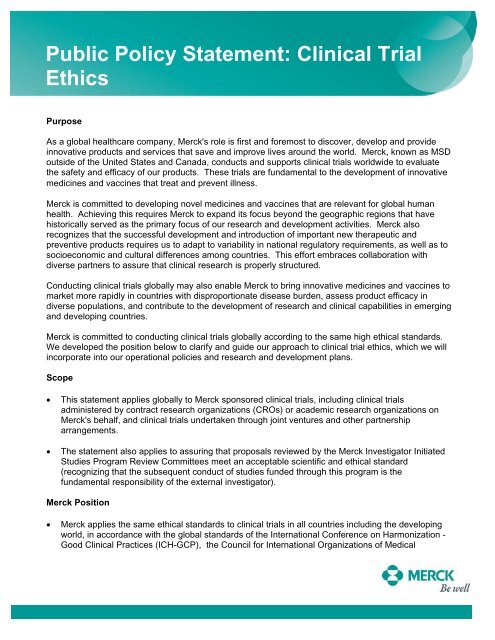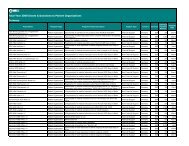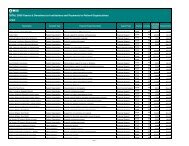Public Policy Statement: Clinical Trial Ethics - Merck.com
Public Policy Statement: Clinical Trial Ethics - Merck.com
Public Policy Statement: Clinical Trial Ethics - Merck.com
Create successful ePaper yourself
Turn your PDF publications into a flip-book with our unique Google optimized e-Paper software.
<strong>Public</strong> <strong>Policy</strong> <strong>Statement</strong>: <strong>Clinical</strong> <strong>Trial</strong><br />
<strong>Ethics</strong><br />
Purpose<br />
As a global healthcare <strong>com</strong>pany, <strong>Merck</strong>'s role is first and foremost to discover, develop and provide<br />
innovative products and services that save and improve lives around the world. <strong>Merck</strong>, known as MSD<br />
outside of the United States and Canada, conducts and supports clinical trials worldwide to evaluate<br />
the safety and efficacy of our products. These trials are fundamental to the development of innovative<br />
medicines and vaccines that treat and prevent illness.<br />
<strong>Merck</strong> is <strong>com</strong>mitted to developing novel medicines and vaccines that are relevant for global human<br />
health. Achieving this requires <strong>Merck</strong> to expand its focus beyond the geographic regions that have<br />
historically served as the primary focus of our research and development activities. <strong>Merck</strong> also<br />
recognizes that the successful development and introduction of important new therapeutic and<br />
preventive products requires us to adapt to variability in national regulatory requirements, as well as to<br />
socioeconomic and cultural differences among countries. This effort embraces collaboration with<br />
diverse partners to assure that clinical research is properly structured.<br />
Conducting clinical trials globally may also enable <strong>Merck</strong> to bring innovative medicines and vaccines to<br />
market more rapidly in countries with disproportionate disease burden, assess product efficacy in<br />
diverse populations, and contribute to the development of research and clinical capabilities in emerging<br />
and developing countries.<br />
<strong>Merck</strong> is <strong>com</strong>mitted to conducting clinical trials globally according to the same high ethical standards.<br />
We developed the position below to clarify and guide our approach to clinical trial ethics, which we will<br />
incorporate into our operational policies and research and development plans.<br />
Scope<br />
• This statement applies globally to <strong>Merck</strong> sponsored clinical trials, including clinical trials<br />
administered by contract research organizations (CROs) or academic research organizations on<br />
<strong>Merck</strong>'s behalf, and clinical trials undertaken through joint ventures and other partnership<br />
arrangements.<br />
• The statement also applies to assuring that proposals reviewed by the <strong>Merck</strong> Investigator Initiated<br />
Studies Program Review Committees meet an acceptable scientific and ethical standard<br />
(recognizing that the subsequent conduct of studies funded through this program is the<br />
fundamental responsibility of the external investigator).<br />
<strong>Merck</strong> Position<br />
• <strong>Merck</strong> applies the same ethical standards to clinical trials in all countries including the developing<br />
world, in accordance with the global standards of the International Conference on Harmonization -<br />
Good <strong>Clinical</strong> Practices (ICH-GCP), the Council for International Organizations of Medical
Sciences International Ethical Guidelines for Biomedical Research Involving Human Subjects<br />
(CIOMS, 2002), the Pharmaceutical Research and Manufacturers of America (PhRMA, 2009)<br />
Principles on Conduct of <strong>Clinical</strong> <strong>Trial</strong>s, applicable local regulatory requirements and following the<br />
ethical principles that have their origin in the Declaration of Helsinki.<br />
• <strong>Merck</strong> <strong>com</strong>plies with all laws and regulations in countries where we conduct clinical trials and<br />
where we market our products, and works closely with national and local authorities to provide<br />
information to demonstrate this <strong>com</strong>pliance.<br />
<strong>Ethics</strong> Committee Review<br />
• <strong>Merck</strong> carries out clinical trials only following approval by <strong>Ethics</strong> Review Committees with<br />
appropriate jurisdiction.<br />
Protocol<br />
• All clinical studies sponsored by <strong>Merck</strong> must have a written plan that describes the scientific,<br />
administrative, and regulatory aspects of the study in a manner that is consistent with currently<br />
accepted scientific methodology, Good <strong>Clinical</strong> Practices and appropriate regulatory requirements.<br />
• <strong>Merck</strong> conducts clinical trials based on scientifically sound protocols that take into account the<br />
potential risks to the research participant along with the possible benefit to the participant and to<br />
society. Scientific, ethical and clinical judgments must guide and support the design of the clinical<br />
trial, particularly those aspects directly affecting the research participants.<br />
• <strong>Merck</strong> is <strong>com</strong>mitted to studying our medicines and vaccines in diverse racial, gender and ethnic<br />
populations, and to achieving this in part through broadening the diversity of the clinical<br />
investigators that we engage in our studies.<br />
Informed Consent<br />
• <strong>Merck</strong> requires that all investigational studies in human subjects be carried out in a manner<br />
respectful of the local culture and consistent with legal statutes and regulations for the protection of<br />
human subjects. <strong>Merck</strong> requires assurances that subjects and/or their legal representatives<br />
understand the procedures, use and any potential disclosure of personal health information, any<br />
potential use of biological samples beyond routine testing, risks/benefits involved in a study,<br />
alternatives to trial participation, and that their participation is voluntary. The subjects will be<br />
informed of the provision of planned post study care and/or product supply, if any, during the<br />
informed consent process.<br />
• Consent must be obtained prior to initiation of any screening procedures that are performed solely<br />
for the purpose of determining eligibility for research. The informed consent procedures and<br />
consent form documents for any clinical study must conform to all relevant legal statutes and<br />
governmental regulations concerning research in human subjects and the privacy and security of<br />
medical information. Consent information should be <strong>com</strong>municated in a manner that ensures both<br />
<strong>com</strong>pliance with local regulatory requirements and the research subject’s understanding (e.g. local<br />
language).<br />
• The consent information and its presentation must <strong>com</strong>ply with all applicable regulations pertinent<br />
to where the data will be submitted and collected.
The elements of the consent form must be consistent with those of the International Conference on<br />
Harmonization Good <strong>Clinical</strong> Practices Document.<br />
• During the course of the trial, the subject must be made aware of any significant new information<br />
that may affect the subject’s willingness to continue participation in the trial.<br />
Use of Placebo Controls<br />
• <strong>Merck</strong> adheres to Council for International Organizations of Medical Sciences (CIOMS, 2002)<br />
Guideline 11, "Choice of control in clinical trials" when determining the intervention used with<br />
control group participants in a clinical trial. Guideline 11 is reproduced below:<br />
• As a general rule, research subjects in the control group of a trial of a diagnostic, therapeutic, or<br />
preventive intervention should receive an established effective intervention. In some circumstances<br />
it may be ethically acceptable to use an alternative <strong>com</strong>parator, such as placebo.<br />
Placebo may be used:<br />
• when both patients receiving test vs. placebo also receive the full standard of care (that is,<br />
the test vs. placebo is in addition to standard therapy);<br />
• when there is no established effective intervention;<br />
• when withholding an established effective intervention would expose subjects to, at most,<br />
temporary dis<strong>com</strong>fort or delay in relief of symptoms;<br />
or<br />
• when use of an established effective intervention as <strong>com</strong>parator would not yield scientifically<br />
reliable results and use of placebo would not invoke an important risk of serious or<br />
irreversible harm to the subjects.<br />
Study Monitoring<br />
• <strong>Merck</strong> conducts worldwide investigational study monitoring to ensure that all clinical studies<br />
sponsored by <strong>Merck</strong> are conducted and reported in <strong>com</strong>pliance with the approved<br />
protocol/amendments(s), <strong>Merck</strong> policies, Good <strong>Clinical</strong> Practices (GCPs), and with applicable<br />
country and state specific regulatory requirements(s). While Contract Research Organizations<br />
(CROs) conducting <strong>Merck</strong>-sponsored trials may use their own procedures, these procedures are<br />
reviewed and approved by <strong>Merck</strong> to ensure they meet regulatory requirements and adhere to<br />
<strong>Merck</strong>'s clinical trials ethical principles. <strong>Merck</strong> also maintains oversight of CRO activities. An<br />
inherent part of monitoring is to ensure that the rights and well being of human subjects are<br />
protected, and the trial data are reported in an accurate, <strong>com</strong>plete, and verifiable fashion <strong>com</strong>pared<br />
to source documents.<br />
Standard of Care, Post Study Care and Availability of Medication<br />
• <strong>Merck</strong> intends for its clinical trials to be responsive to the health needs and priorities of the<br />
populations and <strong>com</strong>munities in which they are carried out. This includes consideration to making<br />
any intervention or product developed, or knowledge generated as a result of clinical trial research,<br />
reasonably available for the benefit of that population or <strong>com</strong>munity, consistent with CIOMS<br />
Guideline 10, "Research in Populations and Communities with Limited Resources".
• <strong>Merck</strong> recognizes that governments have responsibility for ensuring that their citizens have<br />
equitable access to high-quality health care services, including the provision of medicines and<br />
vaccines. In general, the provision of post trial care for clinical trial participants continues under the<br />
applicable health care system of the host country.<br />
• When clinical trials are carried out in countries or <strong>com</strong>munities with limited resources, the sponsor<br />
must determine the appropriate standard of care to be provided to clinical trial participants,<br />
including determining whether or not an investigational agent will be made available after the<br />
clinical trial to trial participants, and determining whether or not other services provided during a<br />
clinical trial will continue after the trial, and under what circumstances. This also applies to<br />
investigation of new indications for licensed medicines. At minimum, health care services will be<br />
provided to the local standard of care where the trial is conducted, and will be sufficient to ensure<br />
the clinical trial will be conducted safely.<br />
• <strong>Merck</strong> will work to ensure the reasonable availability of investigational drugs, new indications for<br />
licensed medicines and any associated health care services following <strong>com</strong>pletion of a study,<br />
consistent with CIOMS guidelines. Given the <strong>com</strong>plexity of factors that may determine the nature<br />
of "reasonable availability" of an investigational agent or a new indication for a licensed medicine,<br />
the measures taken following individual studies will need to be decided on a case by case basis<br />
and may at times include consideration of the provision of other therapeutics available in a country.<br />
Among the factors to be considered are the certainty of the benefit/risk of the investigational<br />
product given the state of the development program, the approval status of the product or indication<br />
in the countries where it is being studied, the length of time the investigational agent and/or<br />
services will be provided to clinical trial participants or to the <strong>com</strong>munity or population in question,<br />
the severity of a subject's medical condition, the effects, if any, of withdrawing the agent or service<br />
(including apparent prior individual therapeutic response), the cost to the participant or health<br />
system of continuing the agent or service, and the ability to monitor the patient following <strong>com</strong>pletion<br />
of the clinical trial.<br />
• When an investigational product or new indication for a licensed product has significant potential to<br />
address a health care need in a host country, <strong>Merck</strong> will consult with appropriate stakeholder<br />
representatives in the country for input on considerations on the definition of reasonable availability<br />
for the particular clinical trial. The stakeholder representatives might include the national<br />
government, health ministry, local health authorities, investigators, scientific and ethics groups, and<br />
representatives of the <strong>com</strong>munity from which clinical trial participants are drawn.<br />
• <strong>Merck</strong> will address the issue of ancillary care (medical issues arising in the course of a trial but<br />
which are unrelated to it) on a situational basis<br />
<strong>Clinical</strong> <strong>Trial</strong> Registration and Results<br />
• <strong>Merck</strong> <strong>com</strong>plies with laws requiring registration of clinical trials and disclosure of clinical trial results,<br />
and is <strong>com</strong>mitted to the transparency of the clinical trials we sponsor.<br />
• Since 2007, <strong>Merck</strong> has registered, at trial initiation, all clinical trials in patients (Phases I-V) that the<br />
<strong>com</strong>pany sponsors and conducts worldwide on www.<strong>Clinical</strong><strong>Trial</strong>s.gov. We also disclose results<br />
from all registered clinical trials of marketed products – regardless of out<strong>com</strong>e – on<br />
www.<strong>Clinical</strong><strong>Trial</strong>s.gov.
Registration of Product<br />
• When addressing whether to conduct a clinical trial in a particular developing country, it is <strong>Merck</strong>'s<br />
intent to pursue registration of the product in the countries where the trial is conducted. Where a<br />
product is studied in a developing country and registration is delayed or is not ultimately pursued,<br />
<strong>Merck</strong> will work to assure access to the product for participants who achieved meaningful benefit.<br />
This approach is specifically intended to assure that benefit is provided to trial participants in<br />
resource-limited settings.<br />
• We will work to initiate registration of our products in all countries where there is a public health<br />
need in a timely manner in conjunction with local regulatory authorities.<br />
• We will work with the World Health Organization to pre-qualify our products, where appropriate, to<br />
expedite access in low in<strong>com</strong>e countries.<br />
March 2012









